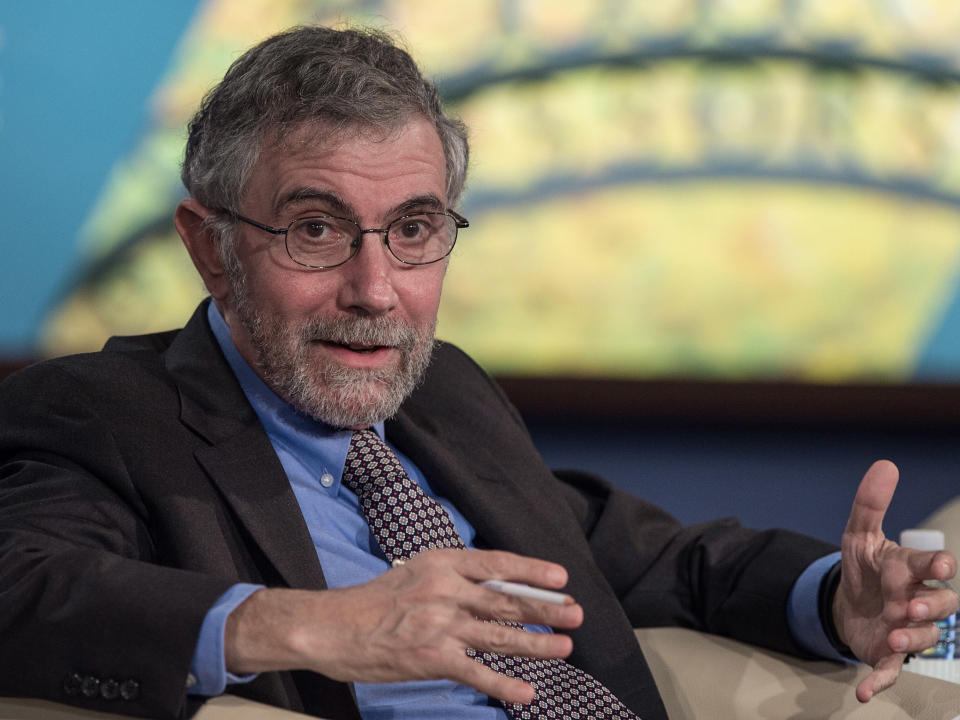Brexit: 'Zero chance' leaving EU will make Britons better off, Nobel laureate economist Paul Krugman says

The Nobel prize-winning economist Paul Krugman has said there is “zero chance” Brexit will boost trade and has slapped down suggestions that leaving the European Union will make Britons better off.
Speaking to The Independent at a conference in London organised by the Centre for Economic Policy Research, he rejected the assertions of Brexiteers that leaving the single market and customs union will ultimately help the UK export more to the rest of the world.
“It’s essentially zero chance that it’ll be beneficial on the trade front,” Mr Krugman said.
“I don’t think there’s any plausible case that Brexit is a good thing for the British economy as a whole.”
Mr Krugman won the Nobel Prize in 2008 for his theoretical breakthroughs on the analysis of international trade patterns.
The overwhelming majority of trade economists are in agreement that leaving the EU is likely to harm the economy, but a small group known as Economists for Free Trade (EFT), who have received extensive coverage from the BBC and the pro-Brexit media, argue that it could boost UK GDP by as much as 4 per cent.
Other prominent Brexiteers, including the Brexit Secretary David Davis, have claimed leaving the bloc will liberate Britain to conclude large export-boosting deals with the likes of the US and China, offsetting any loss of trade with Europe.
In rejecting this hypothesis, Mr Krugman pointed to studies showing how EU membership has significantly enhanced UK trade since the country entered the bloc in 1973.
“The invisible benefits of being part of the EU, the lack of friction [in exports and imports], seems to have had a significant impact on trade patterns,” he said.
“You’re reversing that, so that’s a cost. That’s much more tangible than any pipe dreams about big gains elsewhere.”
Mr Krugman, who is currently Professor of Economics at the City University of New York and is regularly featured at the top of lists of the most influential contemporary economists, said the costs of Brexit could be in the order of 2 per cent of GDP.
“It’s not a huge cost ... but it is a cost,” he said.
A study by economists at the London School of Economics has estimated the damage could be as great as 9.5 per cent of GDP if the UK leaves the EU without a free trade deal.
EFT – formerly known as Economists for Brexit – have claimed that if the UK adopted a policy of “unilateral free trade”, essentially dropping all imports tariffs, the economy would grow more rapidly and living standards would rise.
But such a policy would create major economic turmoil as sectors, such as farming and manufacturing, would suddenly face a flood of cheap imports from abroad.
Moreover, major flaws in the calculations of the EFT group have been exposed.
The Government has said the UK will ultimately leave the single market and customs union and that it wants to conclude a comprehensive free trade deal with the rest of the EU after Brexit.
The value of sterling has been rising in recent weeks, but the pound remains well down on its level against the US dollar on the night of the Brexit referendum, when it experienced a record one-day drop as currency traders bet Brexit would inflict long-term harm on the economy.
“A weaker pound is pretty much what you would expect – and appropriate,” said Mr Krugman. “If you’re going to do this thing then you do want a weaker pound.”

 Yahoo News
Yahoo News 